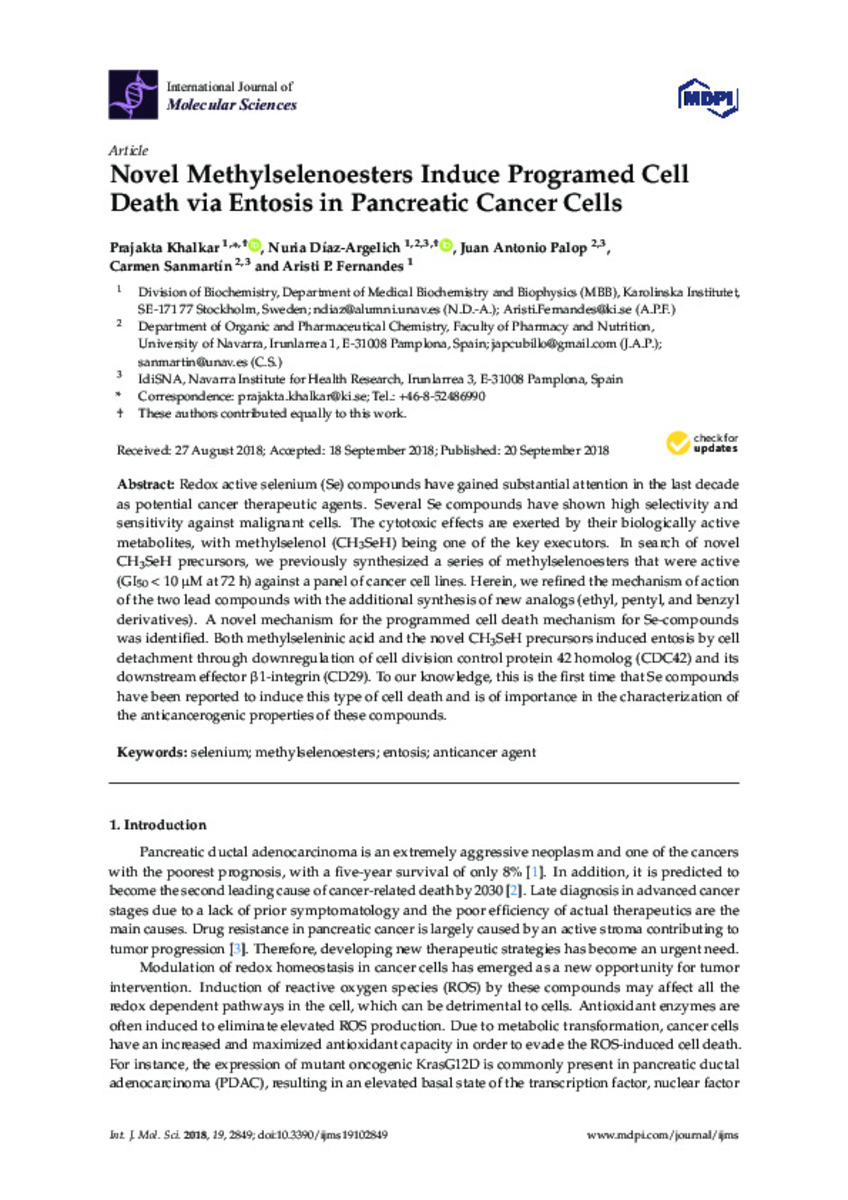Full metadata record
| DC Field | Value | Language |
|---|---|---|
| dc.creator | Khalkar, P. (Prajakta) | - |
| dc.creator | Díaz-Argelich, N. (Nuria) | - |
| dc.creator | Palop-Cubillo, J.A. (Juan Antonio) | - |
| dc.creator | Sanmartin-Grijalba, C. (Carmen) | - |
| dc.creator | Fernandes, A.P. (Aristi P.) | - |
| dc.date.accessioned | 2022-11-30T07:41:59Z | - |
| dc.date.available | 2022-11-30T07:41:59Z | - |
| dc.date.issued | 2018 | - |
| dc.identifier.citation | Khalkar, P. (Prajakta); Díaz-Argelich, N. (Nuria); Palop-Cubillo, J.A. (Juan Antonio); et al. "Novel methylselenoesters induce programed cell death via entosis in pancreatic cancer cells". International journal of molecular sciences. 19 (10), 2018, 2849 | es_ES |
| dc.identifier.issn | 1422-0067 | - |
| dc.identifier.uri | https://hdl.handle.net/10171/64737 | - |
| dc.description.abstract | Redox active selenium (Se) compounds have gained substantial attention in the last decade as potential cancer therapeutic agents. Several Se compounds have shown high selectivity and sensitivity against malignant cells. The cytotoxic effects are exerted by their biologically active metabolites, with methylselenol (CH3SeH) being one of the key executors. In search of novel CH3SeH precursors, we previously synthesized a series of methylselenoesters that were active (GI50 < 10 µM at 72 h) against a panel of cancer cell lines. Herein, we refined the mechanism of action of the two lead compounds with the additional synthesis of new analogs (ethyl, pentyl, and benzyl derivatives). A novel mechanism for the programmed cell death mechanism for Se-compounds was identified. Both methylseleninic acid and the novel CH3SeH precursors induced entosis by cell detachment through downregulation of cell division control protein 42 homolog (CDC42) and its downstream effector β1-integrin (CD29). To our knowledge, this is the first time that Se compounds have been reported to induce this type of cell death and is of importance in the characterization of the anticancerogenic properties of these compounds. | es_ES |
| dc.description.sponsorship | This article has been financially supported by The Swedish Cancer Society (Cancerfonden). The research leading to these results has also received funding from “la Caixa” Banking Foundation through a grant to N.D.-A, who additionally received a mobility scholarship from Asociación de Amigos de la Universidad de Navarra. | es_ES |
| dc.language.iso | eng | es_ES |
| dc.publisher | MDPI AG | es_ES |
| dc.rights | info:eu-repo/semantics/openAccess | es_ES |
| dc.subject | Selenium | es_ES |
| dc.subject | Methylselenoesters | es_ES |
| dc.subject | Entosis | es_ES |
| dc.subject | Anticancer agent | es_ES |
| dc.title | Novel methylselenoesters induce programed cell death via entosis in pancreatic cancer cells | es_ES |
| dc.type | info:eu-repo/semantics/article | es_ES |
| dc.description.note | This article is an open access article distributed under the terms and conditions of the Creative Commons Attribution (CC BY) license (http://creativecommons.org/licenses/by/4.0/). | es_ES |
| dc.identifier.doi | 10.3390/ijms19102849 | - |
| dadun.citation.number | 10 | es_ES |
| dadun.citation.publicationName | International journal of molecular sciences | es_ES |
| dadun.citation.startingPage | 2849 | es_ES |
| dadun.citation.volume | 19 | es_ES |
Files in This Item:
Statistics and impact
Items in Dadun are protected by copyright, with all rights reserved, unless otherwise indicated.






